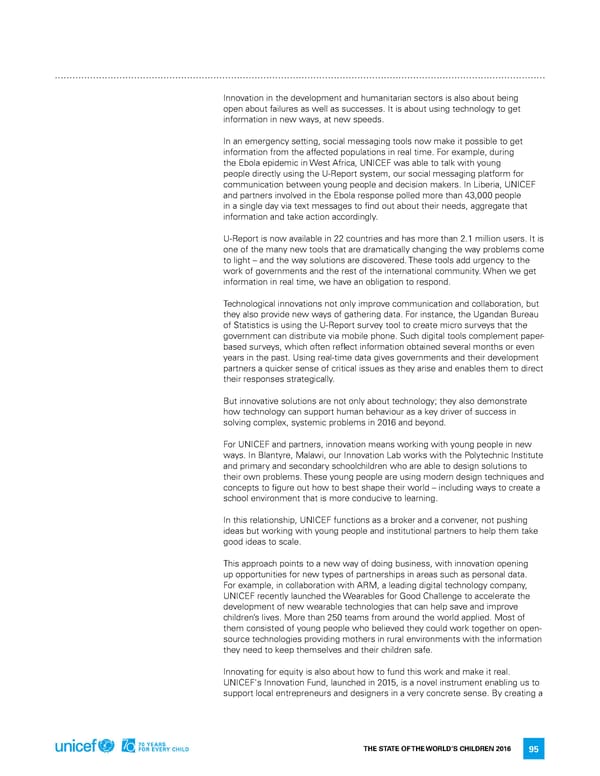innovation in the development and humanitarian sectors is also about being open about failures as well as successes. it is about using technology to get information in new ways, at new speeds. in an emergency setting, social messaging tools now make it possible to get information from the affected populations in real time. for example, during the ebola epidemic in West africa, UniCef was able to talk with young people directly using the U-report system, our social messaging platform for communication between young people and decision makers. in liberia, UniCef and partners involved in the ebola response polled more than 43,000 people in a single day via text messages to find out about their needs, aggregate that information and take action accordingly. U-report is now available in 22 countries and has more than 2.1 million users. it is one of the many new tools that are dramatically changing the way problems come to light – and the way solutions are discovered. These tools add urgency to the work of governments and the rest of the international community. When we get information in real time, we have an obligation to respond. Technological innovations not only improve communication and collaboration, but they also provide new ways of gathering data. for instance, the Ugandan Bureau of Statistics is using the U-report survey tool to create micro surveys that the government can distribute via mobile phone. Such digital tools complement paper- based surveys, which often reflect information obtained several months or even years in the past. Using real-time data gives governments and their development partners a quicker sense of critical issues as they arise and enables them to direct their responses strategically. But innovative solutions are not only about technology; they also demonstrate how technology can support human behaviour as a key driver of success in solving complex, systemic problems in 2016 and beyond. for UniCef and partners, innovation means working with young people in new ways. in Blantyre, Malawi, our innovation lab works with the Polytechnic institute and primary and secondary schoolchildren who are able to design solutions to their own problems. These young people are using modern design techniques and concepts to figure out how to best shape their world – including ways to create a school environment that is more conducive to learning. in this relationship, UniCef functions as a broker and a convener, not pushing ideas but working with young people and institutional partners to help them take good ideas to scale. This approach points to a new way of doing business, with innovation opening up opportunities for new types of partnerships in areas such as personal data. for example, in collaboration with arM, a leading digital technology company, UniCef recently launched the Wearables for Good Challenge to accelerate the development of new wearable technologies that can help save and improve children’s lives. More than 250 teams from around the world applied. Most of them consisted of young people who believed they could work together on open- source technologies providing mothers in rural environments with the information they need to keep themselves and their children safe. innovating for equity is also about how to fund this work and make it real. UniCef's innovation fund, launched in 2015, is a novel instrument enabling us to support local entrepreneurs and designers in a very concrete sense. By creating a The STaTe of The World’S Children 2016 95
 70 Years for Every Child Page 112 Page 114
70 Years for Every Child Page 112 Page 114